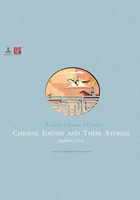
沧海桑田 (cāng hǎi sāng tián)
Forever Changing
There are perhaps hundreds of ways to describe the constant changes in world events. The Chinese idiom Cang Hai Sang Tian, or “the blue sea and the mulberry orchard,” is an attempt at just this.
This expression comes from an ancient Chinese legend. The story goes that in ancient times there was an immortal called Wang Fangping. One day, Wang decided to visit a man whose name was Cai Jing.
Before the immortal’s arrival, the Cai family first heard divine music drifting down from the heavens. Then they saw a group of musicians riding on the back of Chinese unicorns descending into their compound. A moment later, Wang and his entourage arrived.
Wearing a five-color ribbon, Wang was seen sitting in a chariot drawn by five dragons. All his guards were big fellows carrying flags.
When Wang got out of the chariot, all his entourage, including the musicians, vanished. Wang ordered an invisible servant to invite Ma Gu to join him for the dinner.
The Cai family guessed that Ma Gu must be another immortal and they were eager to discover what Ma would look like.
A few minutes later, they heard the invisible servant telling Wang that Ma Gu was inspecting Penglai, a legendary divine island in the East Sea and that she would come to join Wang as soon as she finished the inspection.
When Ma Gu arrived, Cai and his family were surprised to see that Ma was in her late teens and wearing a beautiful gown made of rare embroidered silk.
Wang greeted the girl and ordered the invisible servants to serve dinner. During the meal, the girl told Wang that since she became an immortal, she had seen the vast East Sea turn into a huge mulberry orchard and then become sea again three times.

“During my last inspection tour, I found the sea had become shallow again. I suspect it will turn into a continent soon. And I’m sure such changes will go on forever,” said the divine girl.
After the dinner, the two immortals said good-bye to the Cai family and left in the same manner as they arrived.
Today, few Chinese remember this pedestrian legend, but most of them know this idiom originating from the comment made by the divine girl on the changing East Sea.
Philosophers believe that this is mainly because the expression can help people to understand the transitory nature of man’s life in comparison to the relatively eternal universe.